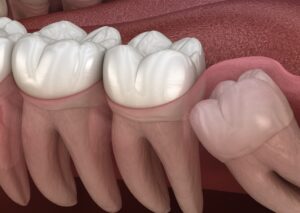 For most cases that involve the need for tooth loss, removing the tooth is required because no other solution will suffice. With the goal of fully restoring your smile, however, many tooth extraction procedures are followed as soon as possible by replacing the extracted tooth. Doing so helps you avoid the potential consequences of tooth loss and rebuild your bite’s ability to function properly. However, with impacted wisdom teeth, which are among the most common types of extracted teeth, there’s typically no need to replace the tooth after it’s been removed.
For most cases that involve the need for tooth loss, removing the tooth is required because no other solution will suffice. With the goal of fully restoring your smile, however, many tooth extraction procedures are followed as soon as possible by replacing the extracted tooth. Doing so helps you avoid the potential consequences of tooth loss and rebuild your bite’s ability to function properly. However, with impacted wisdom teeth, which are among the most common types of extracted teeth, there’s typically no need to replace the tooth after it’s been removed.
An overview of wisdom tooth development
Your wisdom teeth, or third molars, are largely considered remnants of a bygone age, when our ancestors required more chewing power to consumer a much rougher diet. Today, that much chewing power isn’t needed, and more importantly, the typical human dental ridge is no longer large enough to accommodate the extra teeth. Much like the appendix, however, we continue to develop wisdom teeth even though their purpose is no longer clear. For many people, that development leads to a host of problems. Without enough room on your dental ridges, the growth and development of your wisdom teeth can be hindered, leaving the molars impacted within your jawbone structure.
The common need to extract third molars
These days, not everyone develops a third set of permanent molars, while others may develop them without issue. When they do form, you may not know if they’ll cause problems until they do, and the symptoms of these problems may be different for some people than for others. If you do notice signs, such as pain or sensitivity at the back of your dental ridges, then you should schedule an examination as soon as possible. Because the problems they cause are common, having any concerns addressed as soon as possible is the best way to avoid more severe discomfort from developing.
Why your smile may be better without them
If your wisdom teeth have already begun to develop, but you haven’t experienced any problems yet, then you may have a chance at never having to extract your wisdom teeth. However, problems with third molars aren’t always obvious at first, and a lack of symptoms now may not mean that you’re in the clear. Because third molars are extraneous, we may recommend extracting them before they have a chance to become impacted and cause significant damage to your jawbone structure or other teeth.
Learn more about extracting wisdom teeth
Wisdom teeth are one of the most commonly extracted types of teeth, but unlike others, you don’t need to replace them afterward. To learn more about why, or to schedule a consultation, call Santa Rosa Oral Surgery in Santa Rosa, CA, today at 707-545-4625.

